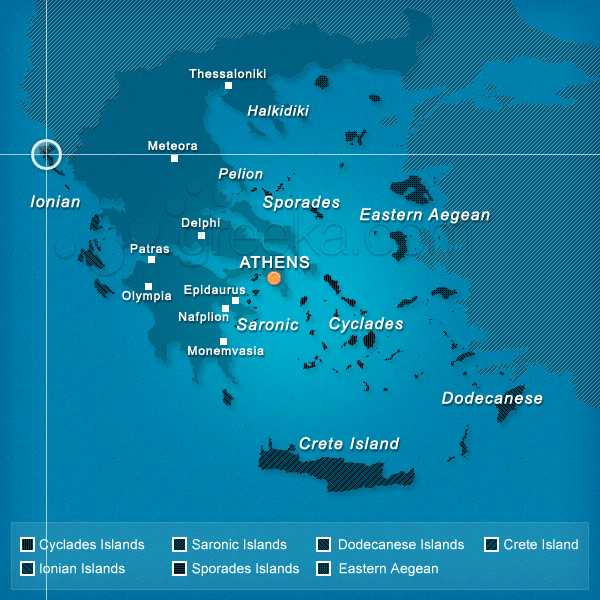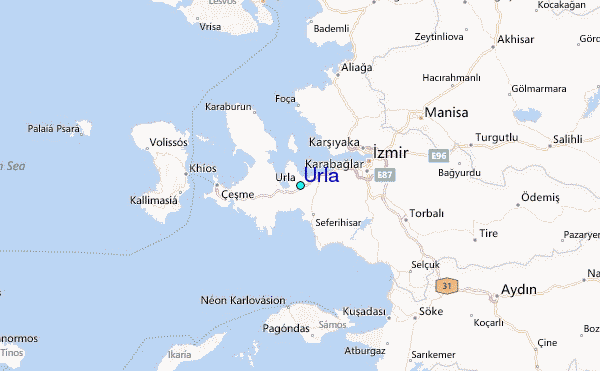officer prisoners held in the fortress on Corfu Island, where
there were many more Turkish civilian prisoners. The
civilians fared much worse than the military POWs.//

Corfu Island (circled at upper left)
Statement about our prisoners from Reserve Officer Ali Rıza,
who has
returned from captivity:
I was taken prisoner along with 40 soldiers and Officer
Candidate Nuri
Efendi of Crete on one of the hills northeast of the train line
in Umurlu
district, Aydın. We were
transported to the Urla quarantine quarters and
after spending 50 days there,
45 of us officers were transported to Athens.
After 12 days there, we were transported, together with 45 officers
taken
prisoner in Thrace, to Corfu Island.
That is where I spent my time in
captivity.,

The writer was taken prisoner near Aydın, transported to Urla and
from there to Athens and Corfu Island.
Right now there are two officer prisoners there who have not
returned.
Out of the approximately 900 civilian prisoners brought to
Corfu, more
than 300 of them died from hunger.
Captain Tahsin, who has come from
the Corfu camp, has the names and
complete details of those who died.
You
should ask him about them.
Colonel İsmail Hakkı, one of the officer prisoners at the
Corfu camp,
was imprisoned by the Greeks because he didn’t provide information
to
the Greeks about Rifleman Ömer Lûtfi, who escaped. All the officers
were jailed but none of them
died or remained there.
During my period of captivity the treatment administered to
the prisoners
by the Greeks was always illegal and despotic. In particular, they made
life difficult for
enlightened officers who love their homeland and nation,
withheld letters and
did whatever they could to make life miserable.
We
obtained food ourselves with the salary they gave us. When they were
having trouble at the front,
they would find an excuse to prevent our
assigned officer from going out to get
food. Sometimes they left us
without
food altogether.
Both the officer prisoners’ and the soldiers’ lodging was
better than the
civilian prisoners’ lodgings.
The civilian prisoners lay on concrete in
the Corfu fortress, without
any mats. In contravention of
international
laws, Captain Tahsin and Regimental Secretary Akif were beaten,
degraded and tortured by the Greek soldiers.
There were notorious
privations in violation of the POW regulations. We
were continuously
confronted with despotic and degrading language. Our complaints
concerned the cruelty
inflicted on officer and soldiers and, in particular,
none of us, including the
civilian prisoners, were afforded
accommodations related to toilet use, as
mandated by our religion.
I have written about my captivity with regard to my
information and
my observations.
1 June 1923
Reserve Lieutenant Ali Rıza
----------------------------------------------------------------------------------
Major’s Statement:
I was taken prisoner by the Greeks at Edirne on 14 July 1920
and
transported to Athens, along with 30 officers. After remaining there
for a short time I was
among 86 officers sent to Corfu Island.
For the
duration of my captivity I was place in a section of the
hospital in the
fortress.
The writer was captured by the Greeks at Edirne, upper
right, and transported first to Athens and then to Corfu
Island, upper left.
When at the time that we were returned from Corfu Island, in the
context of the prisoner
exchange, there were still civilian prisoners
who remained there but we do not
know how many. One of our
officers who
was assigned to look after them in the later period knows
the number of them
who died and who remain. Our prisoner officers
contributed money in the name of
patriotism, humanity and Islam to
support 7 Moslem women who were brought as
prisoners from the
Izmir area.
None of our officers died.
I think that 4 soldiers died of natural
causes in the Corfu hospital .
Their illnesses had been brought on by
dysintery.
Two of our civilian prisoners died in this hospital. I do not know
about one of them but the other
one was the mayor of Ezine. The
fact
that the Greeks did not provide humane treatment accelerated
the deaths. According to what I have heard, civilian prisoners
were
kept in the holds of ships for months with the hatches shut. They
were made to drink sea water and as the
result of no care there were
many of them who died. The civilian prisoners were in a seriously
sad state. Some were naked, while others
were nearly so, and all of
them were in wretched condition. They were deprived of food and
this contributed to the acceleration of
their deaths in prison. In one
month 140
of our co-religionists died because of these conditions.
Although I do not know the reasons and the factors involved
in the
incarceration of our prisoners, it is my conjecture that some of them
were arrested for imagined reasons and others on suspicion. In fact,
although the majority of them gave
the Greeks no trouble, the only
reason they were taken prisoner was because
they did not give up
their money when the Greeks demanded it. I do not know how many
of them died. But when we returned from Corfu Island, there
were
still some civilian prisoners who remained in the prison there, while
others remained confined in the fortress on the island and those inside
the
fortress suffered the worst of degradation and misery. Although
their particulars are not known,
many more of them would have died
had it not been for the support provided to
them by our officers, with
regard to clothes, underwear and money.
The fortress on Corfu Island.
The civilian prisoners suffered terribly throughout their
captivity. Our
treatment was despotic
and against international conventions.
The local
commanders and garrison chiefs acted on their whims and as
they
pleased. For example, our religion mandates ablution but the Greeks
paid no mind to this and for months they kept the bathrooms in the
hospital
shut. And although it was permissible to
go to the town, many
times we were prevented from doing so. Our complaints fell on deaf
ears. Whenever they wanted they would limit our
time in an
unwarranted manner. The
matter of sending and receiving letters was
quite regrettable, although it is
so important for a prisoner and the lack
of mail is dreadfully painful. Sometimes for 5 months, 8 months, or
even a
year there would be no sending or receiving of mail and, with
regard to this
problem, the Greek officials were both incompetent and
avoided all
responsibility.
My impressions about my time in captivity have been
presented.
On leave in Trabzon,
Major Mehiuddin
//END of PART XI//

Hiç yorum yok:
Yorum Gönder